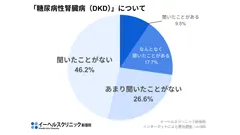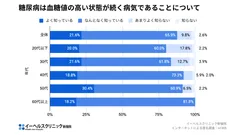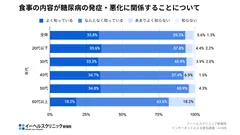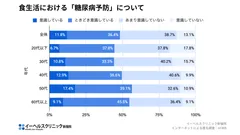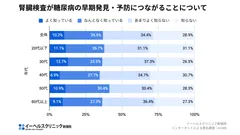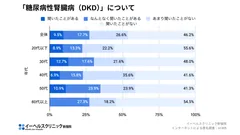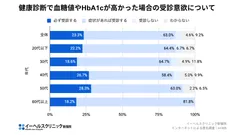<Diabetes awareness exceeds 80%, but lack of understanding of complications such as diabetic kidney disease (DKD) is highlighted <Diabetic kidney disease (DKD) and other complications are poorly understood eHealth clinic Shinjuku Conducts Survey on the Occasion of World Diabetes Day
eHealth clinic Shinjuku
eHealth clinic Shinjuku (Shinjuku-ku, Tokyo) conducted a survey on diabetes on the occasion of World Diabetes Day on November 14, 2025. The results revealed that while awareness of diabetes is over 80%, understanding of complications such as diabetic kidney disease (DKD) is not sufficiently advanced, and there are also issues in the behavior of people who receive medical examinations after health checkups.
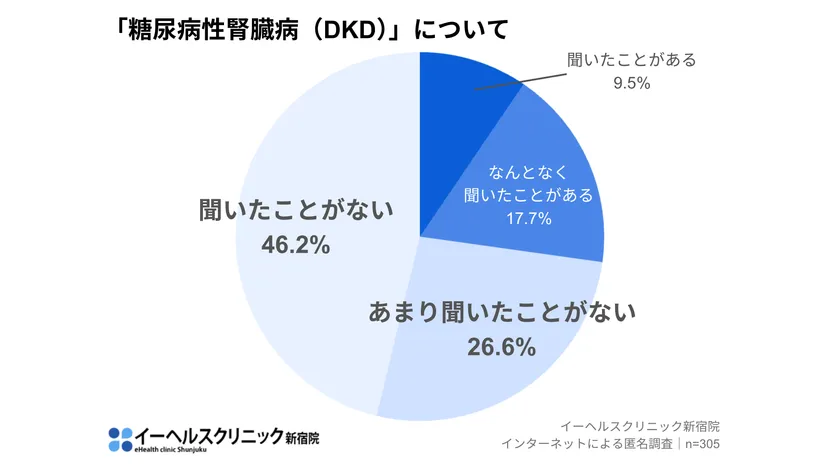
Questionnaire results (1)
November 14 is World Diabetes Day
World Diabetes Day was established by the International Diabetes Federation (IDF) and the World Health Organization (WHO) in 1991 to promote diabetes awareness, and is designated as November 14, the birthday of Dr. Banting, who discovered insulin.
Diabetes is a disease in which blood glucose levels remain high due to abnormalities in the secretion and function of insulin. 2022 international studies reported that the number of adults with diabetes worldwide exceeded 820 million, more than four times the 1990 figure of 198 million. 2023 According to the National Health and Nutrition Survey conducted by the Ministry of Health, Labour and Welfare in 2023, 16.8% of men and 8.9% of women were "strongly suspected" of having diabetes. The total of "strongly suspected diabetes" and "those who cannot deny the possibility of diabetes (pre-diabetic group)" is estimated to be about 1 in 6 adults (about 20 million people).
Complications of diabetes: What is diabetic kidney disease (DKD)?
Diabetic kidney disease (DKD) is a type of chronic kidney disease (CKD) in which kidney functions gradually decline due to diabetes. Overseas studies have shown that about 40% of diabetic patients develop this disease, and it is one of the most common causes of end-stage renal failure.
When high blood sugar levels persist, the glomeruli in the kidneys that filter the blood become damaged, causing proteins (especially albumin) to leak out into the urine. This is called "albuminuria" and is an early sign of DKD. In the early stages, there are few subjective symptoms, and the disease often progresses unnoticed. As symptoms progress, swelling, high blood pressure, and fatigue may appear, eventually leading to end-stage renal failure, which may require dialysis treatment or a kidney transplant.
■Three points in the management of diabetes
In the management of diabetes, it is essential to achieve both "control of blood glucose levels" and "prevention of complications such as DKD. It is important to prevent the onset or worsening of complications caused by diabetes and to maintain the same quality of life (QOL: Quality Of Life) and life expectancy as healthy people. In order to properly manage diabetes, it is important to be aware of the following three points.
Control of blood glucose levels
Control blood glucose levels not only through medication but also through daily diet and exercise.
Regular evaluation of kidneys and blood vessels
Regularly check the condition of kidneys and blood vessels by echography, blood and urine tests, etc.
Lifestyle and dietary habits
Receive professional nutritional guidance from a dietitian, and develop eating habits that can be continued without difficulty
Outline of the survey conducted at our hospital
Name of the survey :Attitude survey on diabetes
Date :October 28, 2025
Method :Anonymous survey via the Internet
Number of subjects : 305 general consumers (average age: approx. 41 years old), male and female, from all over Japan
The survey revealed that even if people have knowledge about diabetes, they are not preventing diabetes.
More than 80% of respondents correctly understood diabetes itself and the relationship between diabetes and dietary habits. On the other hand, less than 50% of the respondents were aware of diabetes prevention in their diets.
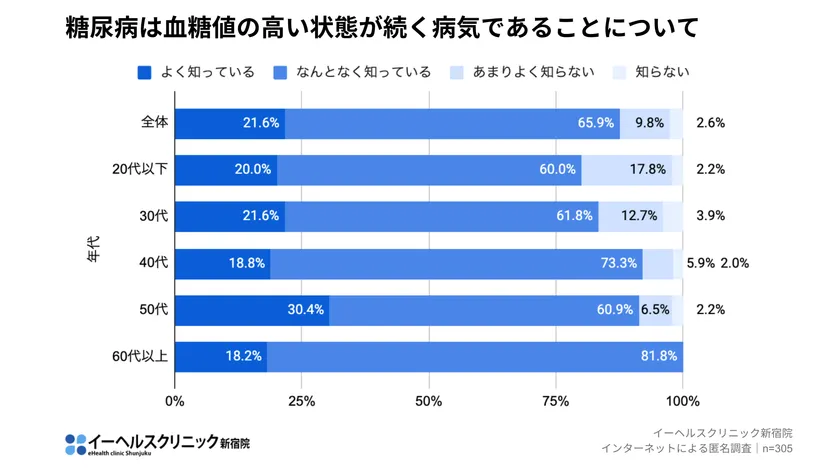
Results of the survey (2)
87.5% of all respondents "know" that diabetes is a disease in which blood glucose levels remain high due to abnormalities in the secretion and function of insulin. By age group, 100% of those in their 60s and older and 80% of those in their 20s and younger responded that they "know" about diabetes, indicating that they have sufficient knowledge about the disease.
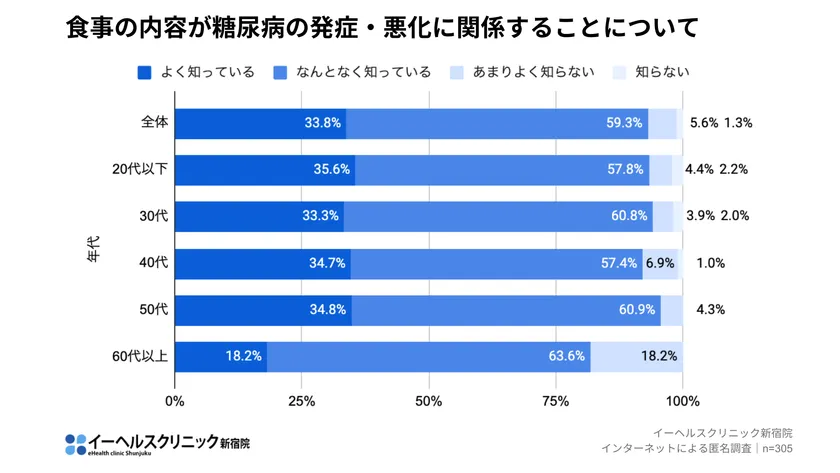
Questionnaire Results (3)
Overall, 93.1% of the respondents answered that they "know" that dietary habits are related to the onset or worsening of diabetes. By generation, more than 80% of all respondents were "aware" of this fact, indicating that understanding is spreading regardless of generation.
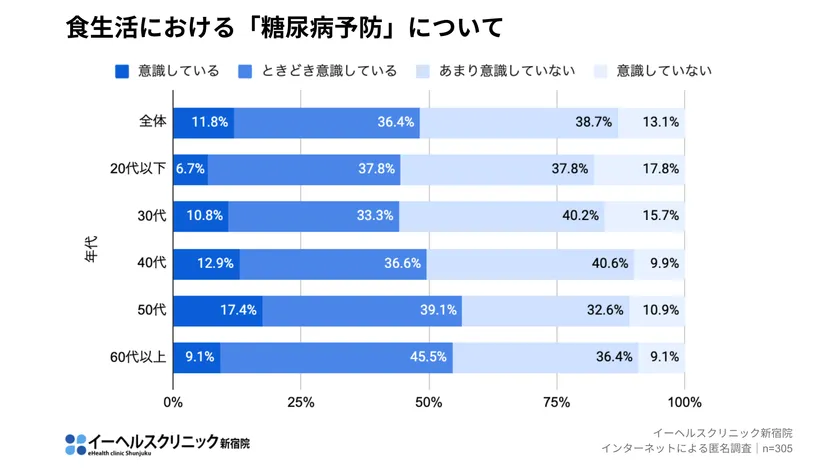
Questionnaire Results (4)
51.8% of respondents were "not aware" of "diabetes prevention" in their diet. In particular, 55.6% of respondents in their 20s and younger and 55.9% of respondents in their 30s answered that they were "not aware" of diabetes prevention, indicating that awareness of diabetes prevention is low among the younger generation.
■DKD awareness is less than 30%, and more than 60% do not receive medical checkups even if their health checkups are abnormal.
Regular examination of kidney function may lead to prevention of diabetes complications and early detection of diabetes. However, 36.8% of respondents were aware of the connection between kidneys and diabetes. In addition, only 27.2% had heard of DKD, indicating that awareness of DKD is not widespread.
Furthermore, only 23.3% of the respondents answered that they "always see a doctor" when abnormalities such as blood glucose levels are detected during a medical checkup. On the other hand, 67.6% of the respondents answered that they would see a doctor if they had symptoms or that they would not see a doctor.
This survey highlights the reality that many people tend to neglect DKD, thinking that "I am fine because I have no symptoms." The fact that the risk of complications such as DKD is not widely known is thought to be one of the factors preventing early consultation and preventive actions.
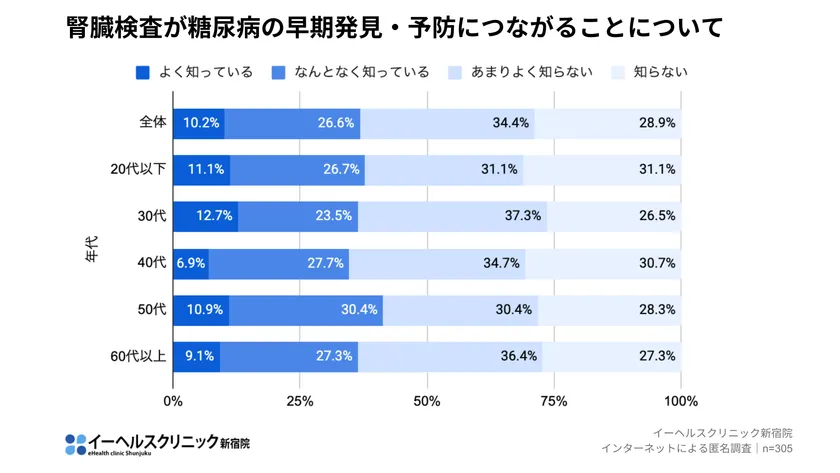
Survey results (5)
Overall, 36.8% of respondents answered that they were aware that regular kidney checkups lead to early detection and prevention of diabetes. There was no significant difference by generation, indicating that there is a lack of understanding among all generations about the relationship between kidney and diabetes.
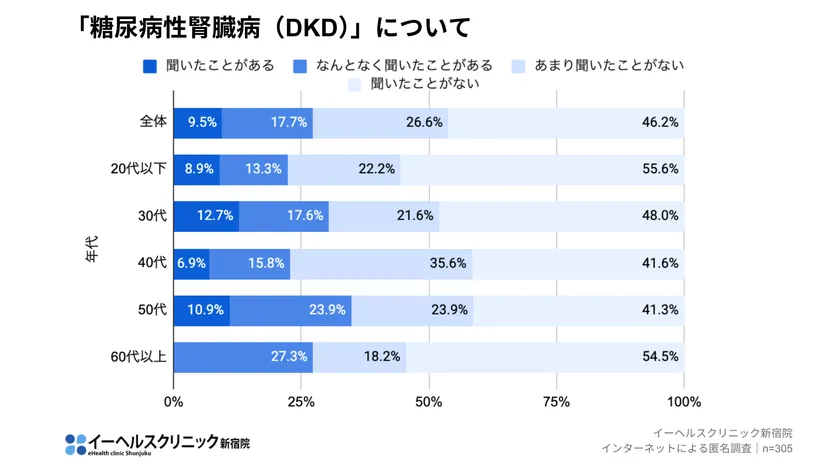
Survey Results (6)
The overall level of awareness of DKD was 27.2%, revealing the need to expand awareness of DKD as well as the relationship between kidney and diabetes. There was no significant difference in the level of awareness by generation.
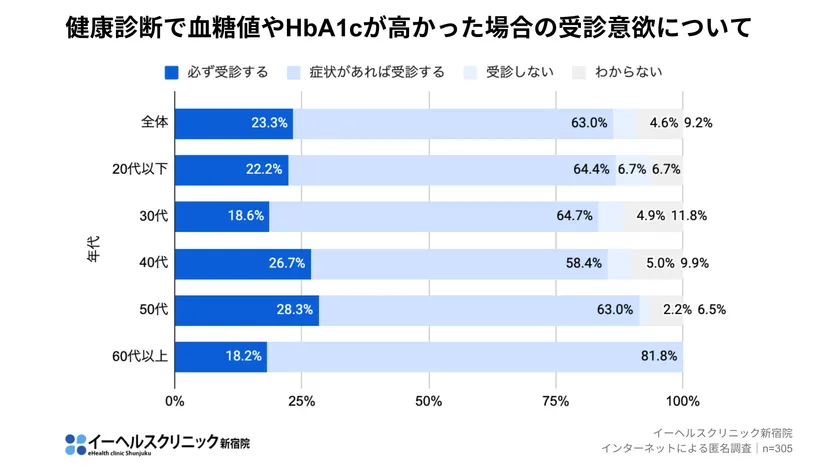
Survey Results (7)
When asked whether they would see a doctor if their blood glucose or HbA1c levels were found to be high during a physical examination, only 23.3% responded that they would definitely see a doctor. The low level of willingness to see a doctor was evident, with 63.0% of all respondents saying they would see a doctor if they had symptoms, and 4.6% saying they would not.
If an abnormality is detected during a physical checkup, do not leave it untreated, but see a doctor as soon as possible.
Diabetes can cause systemic complications, so early detection and early treatment are important. In particular, DKD has almost no initial symptoms, and in many cases, the disease progresses without being noticed. If an abnormality is detected during a physical examination, it is important to visit a medical institution and receive treatment as soon as possible, rather than leaving it untreated.
At eHealth clinic Shinjuku, we have established an outpatient clinic specializing in renal disease, including DKD. We also offer online nutrition counseling by knowledgeable dietitians to support healthier eating habits. For more information, please refer to the following URL
https://ehealthclinic.jp/first/nutrition/
■Outline of Clinic

eHealth clinic Shinjuku
eHealth clinic Shinjuku offers a wide range of health promotion and preventive medicine services, focusing on nephrology, general internal medicine, allergies (hay fever), sexually transmitted diseases, outpatient obesity treatment (medical diet), and vitamin infusion, stem cell supernatant solution, and exosome therapy.
We are one of the few clinics specializing in nephrology. We have a system in place to evaluate the condition of blood vessels through blood and urine tests and echocardiography (ultrasonography), and to detect changes in arteriosclerosis and renal function at an early stage. If your health checkup indicates that your blood glucose level is high, we recommend that you see a doctor and receive treatment as soon as possible. Please contact us for a consultation.
Clinic name: eHealth clinic Shinjuku
Location: Shinjuku Dori Toyo Bldg. 3F, 2-6-4 Shinjuku, Shinjuku-ku, Tokyo
Director: Hoichi Amano
Opening : April 2022
Telephone number : 03-5315-0514
Official Web site: https://ehealthclinic.jp/
<References
https://www.thelancet.com/journals/lancet/article/PIIS0140-6736%2824%2902317-1/fulltext
https://seikatsusyukanbyo.com/statistics/2024/010818.php
Sabrina Scilletta, Maurizio Di Marco, Nicoletta Miano, Agnese Filippello, Stefania Di Mauro, Alessandra Scamporrino, Marco Musmeci, Giuseppe Coppolino, Francesco Di Giacomo Barbagallo, Giosiana Bosco, Roberto Scicali, Salvatore Piro, Francesco Purrello, Antonino Di Pino.Update on Diabetic Kidney Disease (DKD): Focus on Non-Albuminuric DKD and Cardiovascular Risk.Biomolecules,2023,13,5,p.752
- Category:
- Research & Reports
